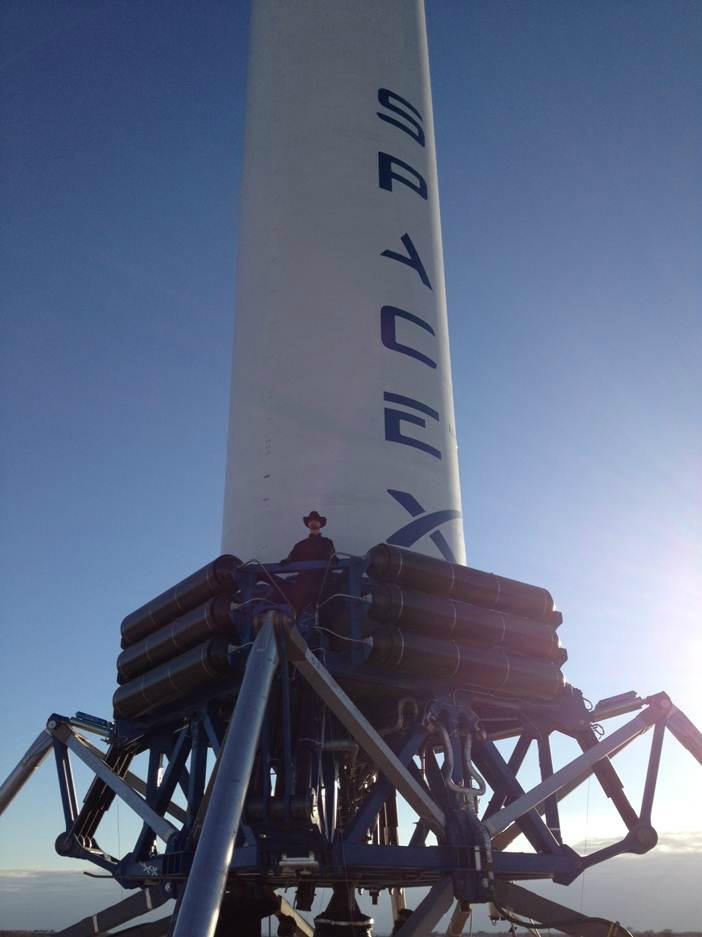The big skies over Texas will soon be graced by thundering rocket launches. Governor Rick Perry and SpaceX made it official Monday, announcing that the rocket company will build a spaceport on the coast near Brownsville.
A combination of financial incentives, pro-business climate and favorable geography wooed the California-based company, and its spaceport furthers the ambitions of Texas to become a major player in the 21st century commercial space industry.
As Texas seeks to build a nucleus of private space businesses, a SpaceX spaceport should further galvanize interest in the state as a place that is friendly not only to NASA but commercial companies as well.
“The support that Texas is showing for this project is something that will ripple forward into the future and will help assure that Texas has a place in the forefront of opening the next frontier,” said Rick Tumlinson, founder of the Texas Space Alliance, which lobbied for commercial space investment.
For now, SpaceX plans to launch only unmanned rockets from Brownsville, but the company's chief executive, Elon Musk, has bold plans that eventually call for sending humans to Mars.
Beginning in 2015 or 2016, the undeveloped 56.5-acre launch site could blast up to 12 rockets a year into space, including two Falcon 9 Heavy rockets. These launches would be for commercial purposes, primarily satellites.
“SpaceX is excited to expand our work in Texas with the world's first commercial launch complex designed specifically for orbital missions,” Musk said in a statement
Beyond mere jobs
To lure SpaceX, the state offered $2.3 million from the Texas Enterprise Fund. In addition, legislators provided $13 million to Cameron County to develop the infrastructure necessary for establishing a spaceport.
Perry said the spaceport will create 300 jobs and pump $85 million in capital investment into the South Texas economy.
But for Brownsville, and the state as a whole, the decision by such a high profile commercial space company like SpaceX to build a launch site in Texas goes beyond mere jobs.
“For a community our size this means so much,” said Gilberto Salinas, of the Brownsville Economic Development Council. “We've got our chance. We can be the next Cape Canaveral if we really want to.”
Beyond the direct jobs, the area anticipates a spin-off effect, and Salinas said a couple of SpaceX suppliers are already looking at the area to be close to the launch site. There is also the economic development from tourism. About 40,000 people go to the vicinity of Kennedy Space Center for unmanned-rocket launches, and even a fraction of that would fill the South Texas region's hotel rooms several times over.
Magnet for bright kids
Perhaps most importantly, Salinas said, SpaceX will serve as a magnet for young, innovative and smart people.
“We believe this will help us retain our brightest students,” Salinas said. “For the longest time we have lost our best and brightest to the big cities in Texas or throughout the United States.”
There should be benefits for Texas as a whole, too, as it seeks to find its place in the rapidly changing spaceflight industry. While NASA and Johnson Space Center are still critical economically to the state, the commercial space industry also has become increasingly important.
SpaceX already tests its rockets near McGregor in Central Texas, and now it will launch them from the Texas coast. XCOR, which is building space planes, has relocated to Midland. Blue Origin, the secretive spaceflight company founded by Amazon's Jeff Bezos, is developing spacecraft in West Texas.
Companies are lured by the geography — South Texas is ideal in offering proximity to the equator and open water to the east — as well as a favorable regulatory environment and financial incentives.
The competition with Florida, Virginia, California and other states tied to the space program for these new opportunities is intense, officials say.
“It's clear that competition to attract commercial space companies is hot and getting hotter,” said Michael Lopez-Alegria, a four-time astronaut and president of the Commercial Spaceflight Federation, an industry association.
“It's not rocket science. An attractive financial package, whether it's cash, offsets, tax advantages or something else, carries a lot of weight.”
————————-
Copyright 2014 – Houston Chronicle
Thanks for reading CPA Practice Advisor!
Subscribe Already registered? Log In
Need more information? Read the FAQs




